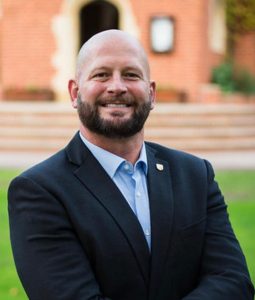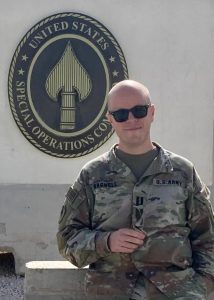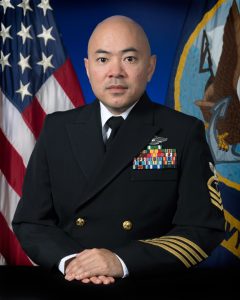By Adam Stone
Military service and the practice of law have more in common than one might suppose. Soldiers and lawyers alike are sworn to uphold the Constitution. Both fields involve an element of selfless service. And there are other similarities.
“Nothing in the military happens without orders. For veterans, the legal community offers a system of law and order that they can find comforting,” says Hugh McClean, UBalt Law associate professor and director of The Bob Parsons Veterans Advocacy Clinic.
In addition, “there’s a belief that the military has a higher standard of professionalism, of morals,” McClean says. “That is an ideal that both military members and members of the bar share: That we’re fighting a just fight.”
Veterans who’ve explored that intersection via a UBalt legal education have found success inside and outside the military: In intelligence law and international law, as JAG officers, and as civil litigators. Here are a few of their stories.
Kristina Sargent, J.D. ’16
In 2012, Kristina Sargent earned a UBalt master’s degree in Legal and Ethical Studies. But that wasn’t enough for her. An enlisted Army National Guard soldier at the time, she deployed to the Gaza Strip, then came back to UBalt for a law degree.
“My last day of active duty with the National Guard was August 11, 2013, and my first day of law school was August 13,” she says. A service-related disability kept her from making officer, so she didn’t become a JAG. But Sargent found other ways to put her law degree to work after leaving the service with the rank of sergeant. (Yes: That’s Sgt. Sargent!)
The Bob Parsons Veterans Advocacy Clinic at UBalt Law introduced Sargent to her mentor, Maryland District Court Judge Halee Weinstein. “She opened the first Veterans Docket, and I helped her develop the mentor program through that,” Sargent says. “When I couldn’t get the medical clearance to be a JAG, she said: Be a prosecutor. You’ll love being a prosecutor!”
Sargent did love it. She worked as a prosecutor in Baltimore City for five years and calls it “the most fulfilling job that I’ve ever had.” She has since moved to Florida, where she is a partner with Burger, Meyer & D’Angelo. She says her military experience has been a key driver of her success as a lawyer.
In uniform, “a large part of my life was just trying to stay alive, while taking care of the welfare of others,” she says. That gives her some perspective, she says.
Tom Jones, J.D. ’99

For Tom Jones, legal practice and military service are naturally complementary.
“They both entail wanting to do things for others and being a part of something bigger than ourselves,” he says. “My time at UB was filled with participation in student organizations, and that set me up with a great foundation of serving others when I joined the Navy. If I’m not serving people, I don’t feel fulfilled, and that started at UB Law.”
Serving others took many forms over the course of Jones’ 20-year military career. He worked first in the Trial Service Office Southeast Detachment in Jacksonville, Fla., and went on to do tours at Naval Legal Service Office Pacific and the Naval Amphibious Base on Coronado Island in San Diego.
The game changed when Jones signed on to do legal work with the SEALs, a job he asked for after the events of 9/11. “I felt like I wanted to be as close to the tip of the spear as I could,” he says. In repeated tours in Iraq, he helped legal authorities there to hold insurgents accountable for their actions. As one of the first JAG officers to be embedded with tactical SEAL teams and Task Force, he was “a bit of a trailblazer.”
At UBalt Law, Professor Mortimer (Tim) Sellers, director of the Center for International and Comparative Law (CICL), “was a great mentor to me,” Jones says. Sellers offered advice as Jones steered toward international law, “and throughout my career. I’d also ask what I could do to help any other CICL fellows to get into the field.”
Jones recently completed an advanced degree at the University of Cambridge under the Faculty of Law, where he studied Baltimore’s homicide issues. “I intend to return to Baltimore and get involved wherever the city needs me most,” he says.
Shane Bagwell, J.D. ’16

Before law school, Shane Bagwell served as an enlisted Army soldier. After graduation, he returned as a military lawyer. He served as a trial defense counsel and later national security law attorney in Hawai’i, deployed with the Special Operations Joint Task Force – Afghanistan during Operation Enduring Freedom and Operation Allies Refuge, and worked most recently as a JAG recruiting officer.
On Jan. 21, 2025, he had his resignation letter drafted. “I saw a potential drift towards a casual approach to the rule of law,” he says. But a sense of duty, and a happy coincidence, kept him on board. His husband recently started law school at the University of Hawai’i, and Bagwell was recently promoted to major and is now serving as the chief of national security law for the 25th Infantry Division.
“You take care of other people in the military, it’s comrades-at-arms. There is an expectation that we look out for each other,” he says. Even as he pondered resigning, comrades still looked out for him, working hard to get him back to Hawai’i.
With the 25th Infantry Division, he’ll be handling intelligence law, international law, administrative and fiscal law. “We’re pivoting back to the Pacific as our main potential theater of conflict, so it’s going to be a pretty busy job,” he says.
As for his ethical concerns, Bagwell has decided he can help from the inside. “As a lawyer, you are in a unique place to be the voice of reason, and the voice of what the law requires.” he says.
Loui Villanueva, J.D. ’26

In the course of 21 years of service to the Navy, Loui Villanueva wore many hats. He deployed to Iraq and Afghanistan, led human resources within the Navy’s radiation protection program, and served as senior medical liaison in an explosive ordnance and disposal training unit.
When he retired in 2020 as chief petty officer, “I had had a long career following orders from different leaders, different political motivations, different wars. I just wanted something different,” he says. The law felt like a natural fit.
As a young man, he’d encountered lawyers and judges who encouraged him to join the military and get his life on track. He came away with a positive feeling about what those in the legal profession can do. He also wanted the sense of personal empowerment that comes with an understanding of the law.
“When I was in the military, I had the power of keeping people or kicking them out,” he says. Sometimes he had to kick them out simply for failing their fitness requirements, and then those requirements would later change. Rules seemed arbitrary; in hindsight, he wishes he had asked more questions.
He especially laments not having taken a more skeptical eye toward Mideast wars that were perhaps dubious in their justification, and that certainly went on too long. “I regret being in a mindset of adhering to the rules, without challenging why those rules were in place,” he says.
Now he’s studying the law with a skeptical eye, asking why things are the way they are, and he’s looking toward a future as perhaps a public defender or a prosecutor.
“I’m leaning into challenging the validity of a lot of law, instead of just following the letter,” he says. “I want to see where the limits are.”
Adam Stone is a writer based in Annapolis.
